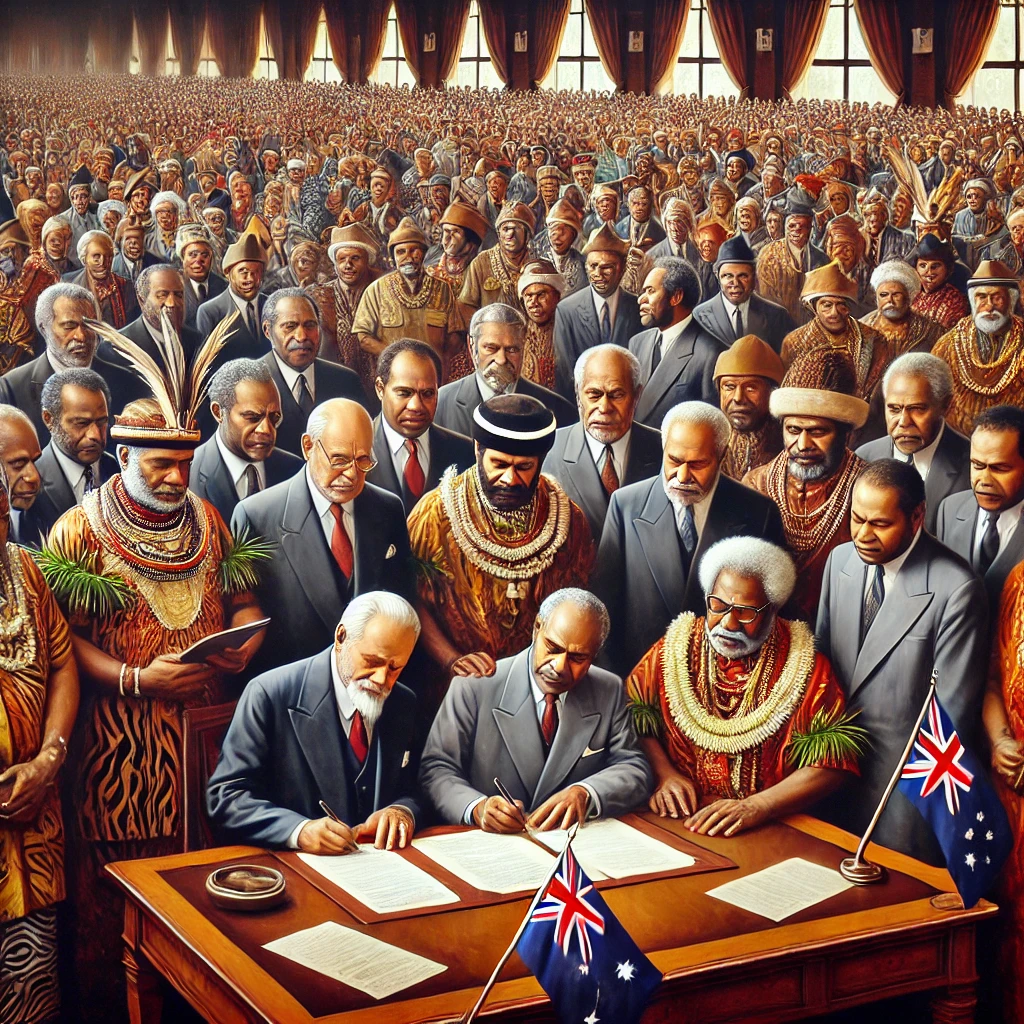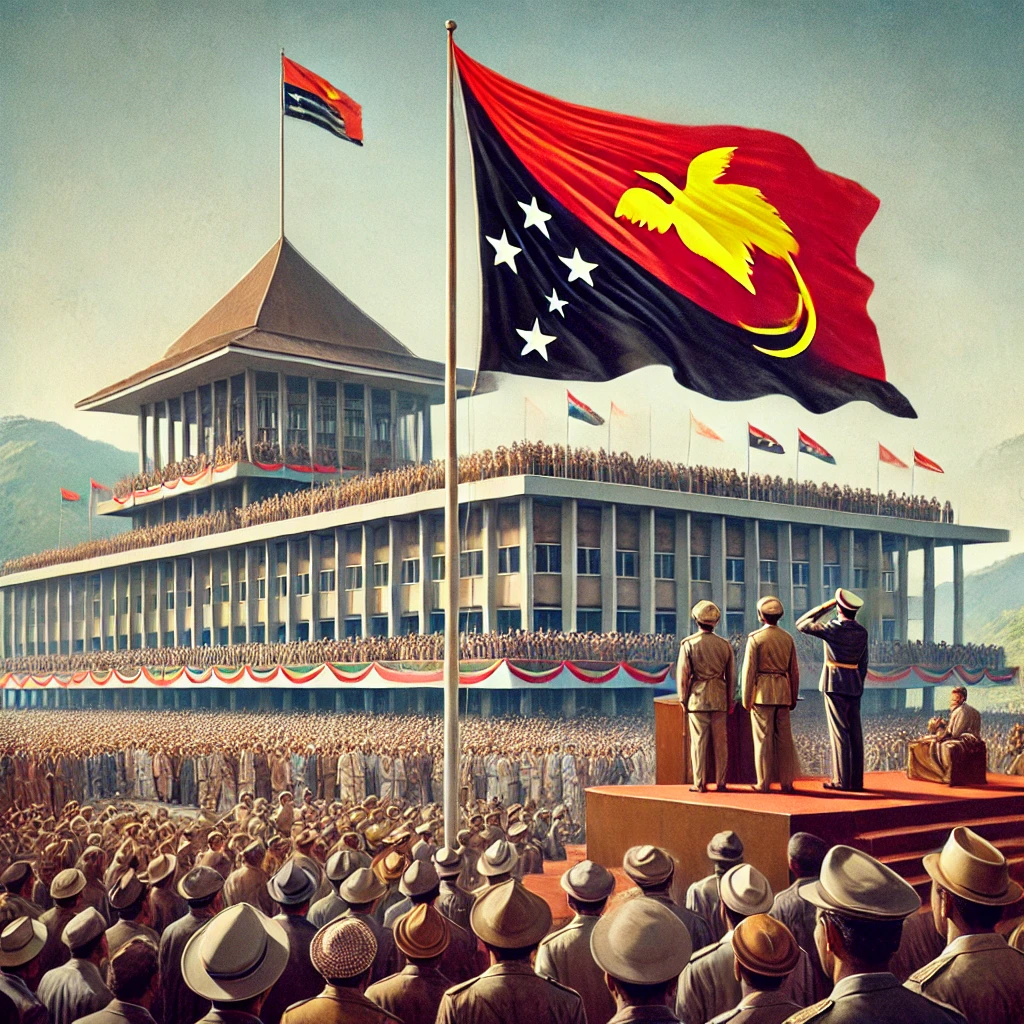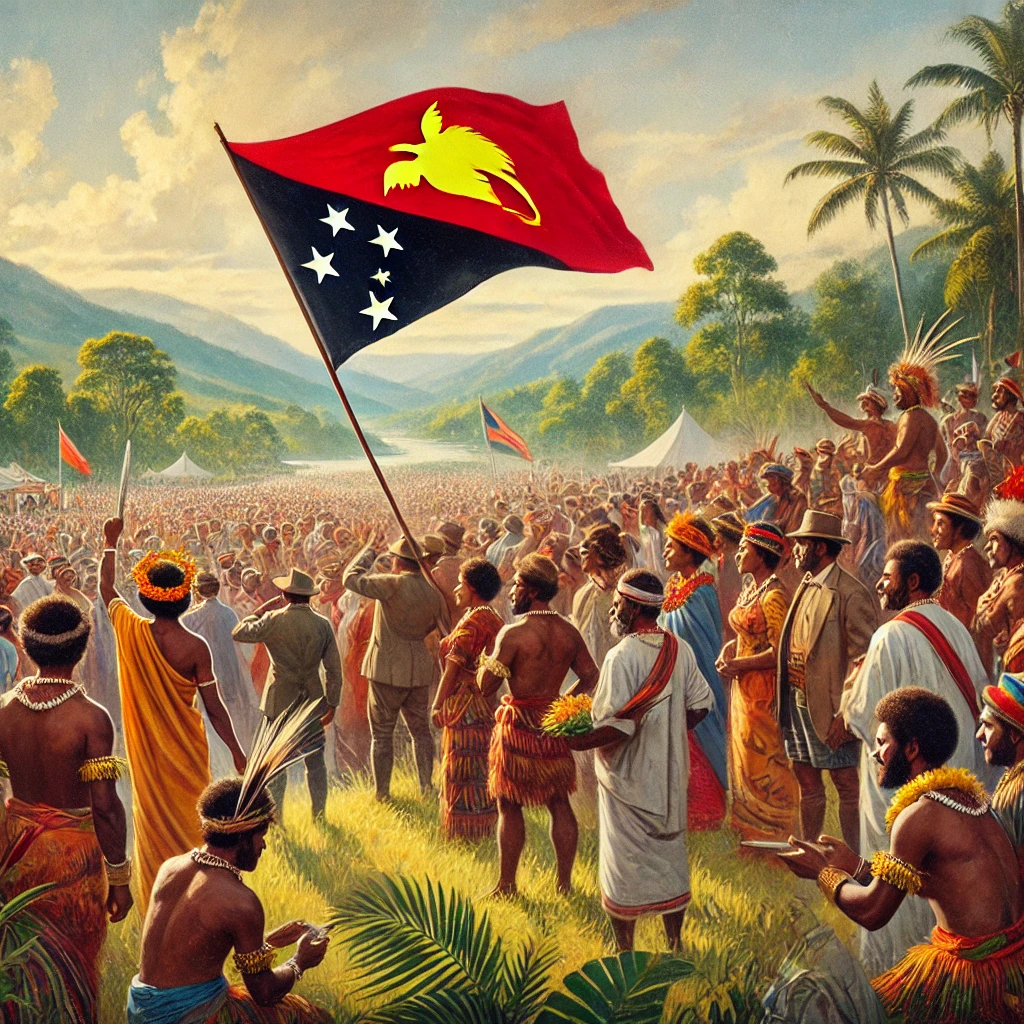On September 16, 1975, Papua New Guinea (PNG) achieved full independence from Australia, marking a significant milestone in its history. This transition from a territory under Australian administration to an independent nation was the culmination of a process shaped by political, social, and economic factors. The road to independence was driven by the desire of Papua New Guineans to exercise self-determination and shape their own future.
Colonial Background and Governance
Papua New Guinea’s colonial history began in the late 19th century when European powers, including Germany and Britain, established control over the region. The territory that is now PNG was divided between German New Guinea in the north and British Papua in the south. Following World War I, the League of Nations mandated the Australian administration of these territories, which later became known as the Territory of Papua and New Guinea.

During the Australian administration, the territory was governed under a combination of direct control and limited local representation. Australian authorities established administrative structures, but the political and economic decisions were predominantly made by Australian officials. This arrangement created a growing sense of discontent among the local population, who increasingly sought a greater role in their governance and a path toward self-determination.
The Push for Self-Government
The 1960s and early 1970s were marked by a surge in nationalist sentiment and a push for self-government across various territories under colonial rule. In Papua New Guinea, this movement was fueled by a desire for political autonomy and the influence of global decolonization trends. Local leaders and political activists began advocating for increased political representation and greater control over their own affairs.
In response to these aspirations, the Australian government initiated a process of political reform aimed at gradually transferring power to local leaders. This process included the establishment of the House of Assembly in 1964, which provided Papua New Guineans with a platform to participate in legislative affairs and shape their own policies. The creation of this institution was a critical step in the decolonization process, laying the groundwork for full independence.

The Path to Independence
The transition to full independence was formalized through a series of constitutional and legislative measures. In 1971, the Australian government and the Papua New Guinean leadership agreed on a timetable for independence, which was set to be achieved by 1975. This plan included the drafting of a new constitution that would establish PNG as an independent and sovereign state.
The constitutional process involved extensive consultations with Papua New Guinean leaders and communities to ensure that the new framework accurately reflected their aspirations and values. The resulting constitution, which was adopted in 1975, established PNG as a parliamentary democracy with a strong emphasis on preserving the cultural diversity and traditional practices of its people.
Achieving Independence
On September 16, 1975, Papua New Guinea officially achieved independence from Australia. The independence ceremony was held in the capital, Port Moresby, and was attended by Australian and Papua New Guinean dignitaries. The new nation was officially recognized as an independent sovereign state, and Michael Somare, a prominent nationalist leader, became the country’s first Prime Minister.

The achievement of independence was celebrated as a significant moment in Papua New Guinea’s history, marking the end of colonial rule and the beginning of a new era of self-governance. The transition was largely peaceful, reflecting the efforts of both Australian authorities and Papua New Guinean leaders to ensure a smooth handover of power.
Post-Independence Challenges
Following independence, Papua New Guinea faced a range of challenges as it embarked on its journey as a sovereign nation. These included the need to build and strengthen national institutions, address socio-economic disparities, and manage the diverse cultural and linguistic landscape of the country.
One of the key challenges was establishing a stable and effective government that could address the needs of the population while promoting national unity. Papua New Guinea’s diverse ethnic and linguistic groups required careful consideration in policy-making to ensure that all communities were represented and their interests were protected.
Economic and Social Development
Economic development was a central focus for Papua New Guinea in the years following independence. The country sought to leverage its natural resources, including minerals and agricultural products, to stimulate economic growth and improve living standards. Investments in infrastructure, education, and healthcare were also priorities for the new government.
Despite these efforts, Papua New Guinea faced ongoing economic and social challenges, including issues related to poverty, corruption, and inequality. Addressing these challenges required continued commitment from the government and support from international partners.
Impact on Australian-Papua New Guinean Relations
The transition to independence marked a new phase in the relationship between Australia and Papua New Guinea. The two countries maintained a close and cooperative relationship, with Australia providing support in areas such as development assistance, trade, and security.
Australia’s role in Papua New Guinea’s independence was recognized as a positive example of a decolonization process that respected the wishes of the local population and facilitated a smooth transition to self-governance. The continued partnership between the two nations has been built on mutual respect and shared interests.
Legacy and Modern Significance
The achievement of independence in 1975 remains a defining moment in Papua New Guinea’s history. It represents the culmination of a long struggle for self-determination and the realization of the aspirations of the country’s people. The independence movement and the subsequent establishment of a sovereign state have had a lasting impact on Papua New Guinea’s national identity and political landscape.
The legacy of independence is also reflected in the ongoing efforts to build a prosperous and equitable society. The challenges faced by Papua New Guinea since independence underscore the importance of continued commitment to democratic principles, economic development, and social cohesion.
Enduring Impact
Papua New Guinea’s journey to independence serves as an important example of the broader process of decolonization that occurred throughout the 20th century. The successful transition from colonial rule to self-governance highlights the importance of respecting the aspirations of indigenous populations and supporting their efforts to shape their own future.
The story of Papua New Guinea’s independence continues to inspire and inform discussions about sovereignty, self-determination, and the role of former colonial powers in supporting the development of newly independent nations. The achievements and challenges of Papua New Guinea since 1975 reflect the ongoing pursuit of a better future for its people.
